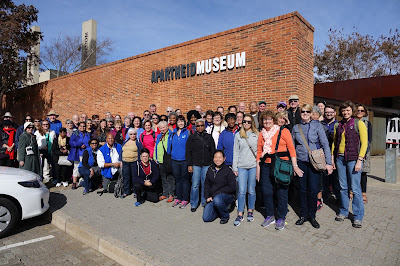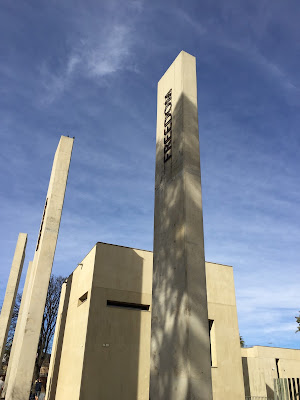Singing City in Johannesburg and Soweto
We arrived in Johannesburg on Friday, July 1, late in the afternoon, and went directly to our hotel on the city's outskirts. The flight was long and tiring but when we arrived at the hotel and found some singers and friends already there waiting for us, we felt revived and settled into a wonderful meal arranged for us by our guides Pieter and Juanita Myburgh.
On Saturday morning we headed into the center of Johannesburg, South Africa's financial center, for a brief driving tour. The city had a feeling of desolation. People were out and about for weekend shopping - lots of street vendors and large white vans that act as the main mode of transportation for many - but we didn't exit the coach. We later learned that
quite a few South Africans work in Johannesburg Monday-Friday and fly
home to towns along the Garden Route or elsewhere in South Africa on the
weekends.
From the center of town, we made our way to the Apartheid Museum. We
were immersed in the history of Apartheid and its aftermath, spending
several hours making our way through the exhibits. Parallels between our
own Civil Rights movement and the Apartheid era in South Africa were
brought into focus. Interestingly, when Apartheid ended in 1994, the new
government in South Africa brought about far more progressive laws
regarding people's freedoms, some that we in the US are still struggling
to implement. But while people in South Africa are free to live
wherever they choose, they still tend to live along ethnic, racial and
economic divisions. Housing shortages are a continuing problem, with new
immigrants living along the edges of established communities in
tin-roofed shanties. The differences are stark.
It takes at least two hours to make your way through the Apartheid Musuem and, even then, you are just scratching the surface. Apartheid began in 1948, the year that Singing City was founded. Our own beginnings are linked to similar struggles here at home and the Civil Rights movement.
It takes at least two hours to make your way through the Apartheid Musuem and, even then, you are just scratching the surface. Apartheid began in 1948, the year that Singing City was founded. Our own beginnings are linked to similar struggles here at home and the Civil Rights movement.
From there, we enjoyed an afternoon workshop with Mbuso Ndlovu, a Music Director and Choir Conductor, who worked with us on some of the South Africa repertoire we prepared back at home and also taught us something brand new. He marveled at our attempts to choreograph Dubula and did his best to help us move with a bit more grace and style. Here's hoping we can bring him to the US to spend more time with us!
Mbuso Ndlovu
We enjoyed dinner at Carnivore Restaurant, where grilled meats of every description are the focus. It reminded me of our first dinner in Brazil in 2009, a Chiascurria. The meal is served family style with servers bringing skewers of delectable meats one after the other, ranging from boerewors and lamb to ostrich, kudu and crocodile and, for the less adventurous, chicken and beef. Fully sated, we made our way back to the hotel for some rest before a 7 a.m. wake up call the next morning.
At Singing City, we talk often about music's power to open minds and hearts. This experience was proof positive of that. Interestingly, an article by Alex Ross in the July 4 issue of The New Yorker, entitled "The Sound of Hate" posits that if we agree that music has the power to "soothe the savage breast," we must also recognize that it can be used for darker purposes–inciting violence. Read it here.
We ended the day with dinner at Robby's Place, known as a local shabeen (technically, an "unlicensed establishment or private house selling alcoholic liquor and typically regarded as slightly disreputable"). This may once have been the case, but Robby's Place is a small local, family restaurant in Soweto that served up a delicious spread of comfort food, including Malva Pudding for dessert, a new favorite. Robby was there to greet us, dinner was ready, and we settled in to enjoy the food and each others' company after an exhausting and satisfying day.
If you are in the neighborhood, it's highly recommended!


















No comments:
Post a Comment